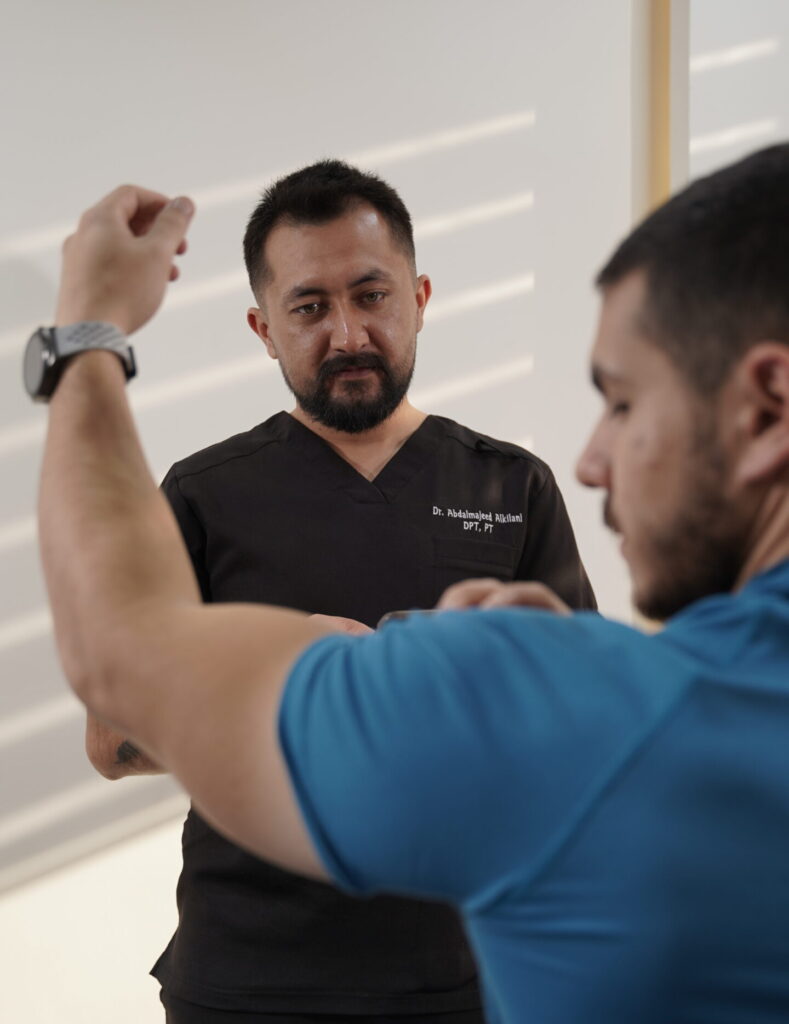Understanding Frozen Shoulder: Causes, Symptoms, and Treatments
Kilani
December 21, 2024

Frozen Shoulder Treatment Introduction
Frozen shoulder, medically known as adhesive capsulitis, is a condition characterized by stiffness, pain, and limited range of motion in the shoulder joint. It typically develops gradually and progresses through distinct stages, significantly impacting daily activities. While its exact cause remains unclear in many cases, early diagnosis and appropriate treatment can help manage symptoms and restore mobility.
Symptoms
:Frozen shoulder usually presents with the following symptom
Pain: Persistent and aching pain in the shoulder, often worse at night or during move
Stiffness: A marked reduction in the ability to move the shoulder in all directions
Limited Range of Motion: Difficulty performing everyday tasks such as reaching overhead, dressing, or lifting objects.( this is the most functional limitation we facing in kilani physiotherapy center)
:The condition progresses through three stages
Freezing Stage: Pain and stiffness gradually increase, lasting several weeks to months, and we advice our clients in kilani center to start with physiotherapy as soon as possible in this stage so thay can restore their ability to move in full range and free pain
.Frozen Stage: Pain may decrease, but stiffness and mobility loss persist, often lasting 4 to 6 months
.Thawing Stage: Gradual improvement in mobility and reduction of symptoms over months to years
Causes
Injury or Surgery: Immobilization of the shoulder due to trauma or post-operative recovery
Medical Conditions: Diabetes, thyroid disorders, or cardiovascular disease increase the risk
Age and Gender: It most commonly affects individuals between 40 and 60 years old, with a higher prevalence in women
( the most age category patients of frozen shoulder in our center is older adult around 60 years)
Inflammation: Chronic inflammation of the shoulder joint capsule can lead to thickening and scarring, restricting movement
Functional Disabilities
:Frozen shoulder can severely impact daily activities and quality of life. Common challenges include
.Inability to reach for objects on shelves
.Difficulty dressing or grooming
.Pain that disrupts sleep, leading to fatigue
.Reduced ability to perform work-related or recreational activities
Frozen Shoulder Treatment
Treatment for frozen shoulder focuses on relieving pain, restoring range of motion, and preventing recurrence. Common approaches include
Medications: Over-the-counter pain relievers like NSAIDs and, in some cases, corticosteroid injections to reduce inflammation and pain
Heat and Cold Therapy: Alternating hot packs and ice packs to manage pain and stiffness.( we ask our patient to do it as part of home program therapy)
Manipulation Under Anesthesia (MUA): In severe cases, a procedure where the shoulder is moved under anesthesia to break adhesions and improve mobility.
Surgical Intervention: Rarely needed, but arthroscopic surgery may be performed to release tight joint capsule areas.
Physiotherapy Treatment Methods and Exercises
Physiotherapy plays a crucial role in managing frozen shoulder, emphasizing pain reduction, mobility restoration, and strength building. Key methods include
Manual Therapy: Gentle mobilizations and stretching techniques to loosen the joint capsule and improve flexibility
Ultrasound Therapy: Uses sound waves to reduce inflammation and promote tissue healing
Range of Motion Exercises
Pendulum Swings: Lean forward, letting the affected arm dangle, and gently swing it in small circles
Towel Stretch: Hold a towel behind your back with both hands, pulling upward with the unaffected arm to stretch the shoulder, and some times our physiotherapists in kilani physiotherapy center use small can to do exercises
Wall Climbing: Use your fingers to “climb” a wall, gradually increasing shoulder elevation
Strengthening Exercises
Resistance bands to improve shoulder strength without overloading the joint
Rotator cuff exercises to enhance stability
Physiotherapists customize these exercises based on the patient’s stage of frozen shoulder and overall condition
Conclusion
Frozen shoulder is a challenging condition that requires a multifaceted treatment approach for effective recovery. Early intervention, physiotherapy, and consistent home exercises can significantly reduce symptoms and improve quality of life. With proper care and management, individuals can regain shoulder mobility and return to their daily activities
If you have this problem please contact us on our phone numbers in our two branches (Jordan and dubai), and we are available to answer any questions about your health problems in our pages on Instagram, Facebook and tik tok.
